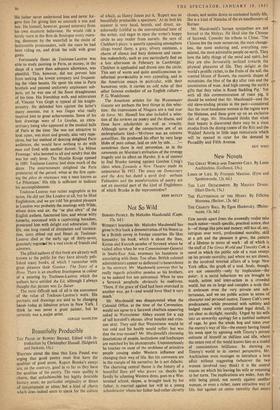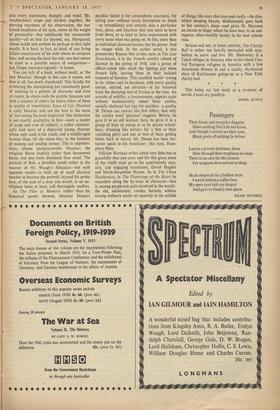New Novels
THE CHARITY BALL. By Egon Hostovsky. (Heine- mann, 13s. 6d.) FEW novels apart from the avowedly realist take much notice—much specific, practical notice, that is—of things like jobs and money; still less of, say, intrigues over work, professional morality, skill at a lob and the pleasure it gives, the pattern of a lifetime in terms of work : all of which is the stuff of The Great World and Timothy Colt, a novel in which the public side of a man sweeps up his private morality, and where we are shown, in the involved internal affairs of a large New York office, the graph of a soul. Souls, though, are not ostensibly—only by implication—the point : it is social behaviour we are brought to watch, action and inter-action in a crowded world, but on so large and complex a scale that it embraces even the very private and sub- terranean, and we see public action in terms of character and personal motive. Timmy Colt's own predicament, while presented with subtlety and hedged round with complicated legal detail, is yet clear as daylight, morally. Urged by his wife into an unworthy apology for a justified outburst of rage, he goes the whole hog and takes over the enemy's way of life—the enemy having found his weak spot by agreeing with Timmy's private estimate of himself as shiftless and idle, where the entire rest of the world knows him as a model of conscientious brilliance. In showing us Timmy's world in its correct perspective. Mr. Auchincloss even manages to introduce a love affair without suggesting (whatever the two women involved may think) it is the central reason on which his leaving his wife or returning to her turns. The implications are wider, Ann the wife being pitted, not merely against another woman, or even a richer, more attractive way of life, but against an entire morality that enters producing the unsurprising but consistently good, of working to a pattern of character and even of events, he shares with the prolific Simenon and with a number of others far below either of them in quality or importance. Lines of Life (Destins) is early Mauriac and not the best in the sense of 'not among the most important' (the distinction is not exactly qualitative in him—more a matter of scope and even of subject); a rather cinemati- cally told story of a depraved young charmer whose only asset is his youth, and a middle-aged woman deep, till she meets him, in the business of making and tending money. This is unpreten- tious, almost uncharacteristic Mauriac; the religious theme implicit rather than hammered home, and pity more dominant than usual. The portrait of Bob, a dreadful youth rather in the manner of Mr. Waugh's Sebastian—but with opposite results—is built up of small physical touches to become the portrait, beyond his pretty face, of the soul of a man you would, in an un- religious sense at least, call thoroughly soulless.
As The Film of Memory rather than his historical novels showed, Maurice Druon's into every movement, thought, and word. Mr. Auchincloss's scope and subtlety together, the piercing exactness of his observation, the sus- tained excellence of his style, above all the weight of personality—that indefinable but measurable quality—all set him far beyond, say, Marquand, whose world and method he perhaps at first sight recalls. It is hard, in fact, to think of any living fellow-countryman of his with whom to compare him; and among the dead the only one that comes to mind as a possible source of comparison— not, I hope, too extravagantly—is James.
You can talk of a book, without insult, as 'the new Mauriac' (though in this case it means, not • new at all, but newly translated). This faculty for peculiar talent is for atmospheric exactness, for taking you—without much description or detail —so immediately and entirely into a particular time, place, and situation that you seem to have lived there, or at least to have experienced with every sense what was going on. In this, more than in individual characterisation, lies his power. And he ranges wide. In the earlier novel, it was present-day Roman film circles; now, in The Last Detachment, it is the French cavalry school of Saumur in the spring of 1940, and a group of officer-cadets who reach the fighting just when France falls, leaving them to their isolated -moment of heroism. This youthful world—young in its virtues and its hardness, with every quality unripe, untried, yet altruistic—is far removed from the decaying rest of France at the time. An aureole of nobility, a luminousness, appears quite without sentimentality about these youths, socially sheltered but ripe for sacrifice : a quality M. Druon can convey like few others, that only the tawdry word 'glamour' suggests. Before, he gave it to an old woman; here, he gives it to a group of boys so young as to be almost school- boys, straining like terriers for a bite at their vanishing glory and one or two of them getting bitten back in return. Mr. Druon has been for- tunate again in his translator : this time, Hum- phrey Hare.
Felicien Marceau writes about very little but so gracefully that you care; and for this grace some of the credit must go to his superlatively easy, airy, and engaging ,translators, David Hughes and Marie-Jacqueline Mason. As in The China Shepherdess, in The Flutterings of the Heart he meanders along the by-ways of character—that is, among peoplenot quite involved in the world : the old, adolescents, cranks, hermits, seldom among ordinary adults set squarely in the middle of things. His story this time ends sadly—the dim- witted sleeping beauty, disillusioned, goes back to her century's sleep—and gives M. Marceau an excuse to linger where he does best, in an out- rageous other-worldly family in his best solemn vein.
Serious and not, at times, unwitty, The Charity Ball is rather too heavily encrusted with sym- bolism to move and live. Mr. Hostovsky is a Czech refugee in America who writes about Cen- tral European refugees in America with a few Americans thrown in and a stately, rhythmical story of Kakfaesque goings-on at a New York charity ball.
ISABEL QUIGLY



































 Previous page
Previous page